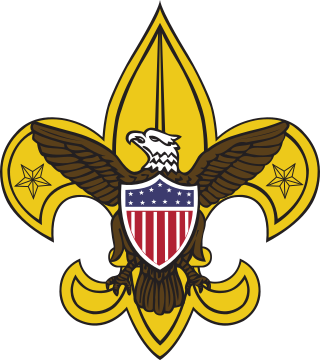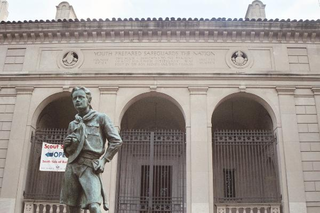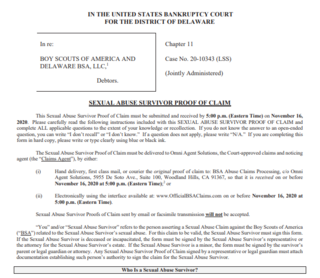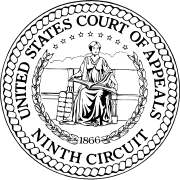
The Boy Scouts of America is one of the largest scouting organizations and one of the largest youth organizations in the United States, with about 762,000 youth participants. The BSA was founded in 1910, and since then, about 110 million Americans have participated in BSA programs. BSA is part of the international Scout Movement and became a founding member organization of the World Organization of the Scout Movement in 1922.
Boy Scouts of America et al. v. Dale, 530 U.S. 640 (2000), was a landmark decision of the US Supreme Court, decided on June 28, 2000, that held that the constitutional right to freedom of association allowed the Boy Scouts of America (BSA) to exclude a homosexual person from membership in spite of a state law requiring equal treatment of homosexuals in public accommodations. More generally, the court ruled that a private organization such as the BSA may exclude a person from membership when "the presence of that person affects in a significant way the group's ability to advocate public or private viewpoints". In a 5-4 decision, the Supreme Court ruled that opposition to homosexuality is part of BSA's "expressive message" and that allowing homosexuals as adult leaders would interfere with that message.
Engel v. Vitale, 370 U.S. 421 (1962), was a landmark United States Supreme Court case in which the Court ruled that it is unconstitutional for state officials to compose an official school prayer and encourage its recitation in public schools, due to violation of the First Amendment. The ruling has been the subject of intense debate.

A variety of religious emblems programs are used by the Boy Scouts of America (BSA) to encourage youth to learn about their faith and to recognize adults who provide significant service to youth in a religious environment. These religious programs are created, administered and awarded by the various religious groups, not the BSA, but each program must be recognized by the BSA.
The Boy Scouts of America (BSA), one of the largest private youth organizations in the United States, has policies which prohibit those who are not willing to subscribe to the BSA's Declaration of Religious Principle, which has been interpreted by some as banning atheists, and, until January 2014, prohibited all "known or avowed homosexuals", from membership in its Scouting program. The ban on adults who are "open or avowed homosexuals" from leadership positions was lifted in July 2015.

The San Diego-Imperial Council is headquartered in San Diego, California, and serves youth members and volunteer leaders through Scout units in San Diego and Imperial counties of Southern California, as well as a portion of Arizona.
Randall v. Orange County Council, 17 Cal.4th 736, 952 P.2d 261, 72 Cal.Rptr.2d 453 (1998), was a case before the Supreme Court of California that established that groups such as the Boy Scouts of America are not considered "business establishments" as used in the state's Unruh Civil Rights Act and could not be subject to its provisions. Its companion case was Curran v. Mount Diablo Council of the Boy Scouts of America, 17 Cal.4th 670, 952 P.2d 218, 72 Cal.Rptr.2d 410 (1998).

Welsh v. Boy Scouts of America, 993 F.2d 1267, was a decision by the United States Court of Appeals for the Seventh Circuit that upheld the right of private organizations to discriminate on the basis of religion when establishing their own membership standards.

The Support Our Scouts Act of 2005 was passed as part of the Department of Defense Appropriations Act, 2006 to prevent Local, State and Federal agencies from reducing their support for the Boy Scouts of America. The bill was passed in the wake of a number of controversies involving the Boy Scouts of America, such as their exclusion of gays and atheists, and subsequent attempts to limit government support of the organization.

Scouts BSA is the flagship program and membership level of the Boy Scouts of America (BSA) for boys and girls between the ages of typically 11 and 17. It provides youth training in character, citizenship, and mental and personal fitness. Scouts are expected to develop personal religious values, learn the principles of American heritage and government, and acquire skills to become successful adults.

Winkler v. Rumsfeld was a case regarding the United States Armed Forces and their support of the Boy Scouts of America's national Scout jamborees.
Evans v. Berkeley was a court case which upheld the right of governmental entities in California to withhold support from non-profit organizations that practice discrimination on the basis of sexual orientation.

Scouting in the United States is dominated by the 1.2 million-member Boy Scouts of America and the Girl Scouts of the USA and other associations that are recognized by one of the international Scouting organizations. There are also a few smaller, independent groups that are considered to be "Scout-like" or otherwise Scouting related.

Religion in Scouting and Guiding is an aspect of the Scout method that has been practiced differently and given different interpretations in different parts of the world over the years.

There are various controversies and conflicts that involve the Scouting movement. Scouting has sometimes become entangled in social controversies such as in nationalist resistance movements in India. Scouting was introduced to Africa by British officials as an instrument of colonial authority but became a subversive challenge to the legitimacy of British imperialism as Scouting fostered solidarity amongst African Scouts. There are also controversies and challenges within the Scout Movement itself such as current efforts to turn Scouts Canada into a democratic organization.
The Youth Protection program is a set of standards, guidelines and training developed by the Boy Scouts of America to eliminate opportunities for the abuse of youth members. All adults are required to undergo a criminal background check and to complete a Youth Protection Program training before being registered as BSA leaders and they must be re-certified every 2 years. Venturing Crew leaders will complete the Venturing Leader Youth Protection training. If a Crew is also associated with a Troop, the adult leaders must complete both Youth Protection training and Venturing Leader Youth Protection training. This is a requirement fulfilling the internet recharter process. When properly implemented, the program also helps to protect adult leaders from any accusations of impropriety.

Founded in 1915, the Greater Los Angeles Area Council (GLAAC) (#033) served most of the City of Los Angeles as well as several other cities in the greater Los Angeles area. It was one of five Boy Scouts of America councils in Los Angeles County, California. Since its founding in 1915, the Los Angeles Area Council has brought its purpose and values to millions of youth. The Council served 54,567 youth in the Greater Los Angeles Area in 2008 alone.

Wrenn v. Boy Scouts of America, No. 3:03-cv-04057, was a case before the United States District Court for the Northern District of California; Wrenn asked for the cancellation of federal trademark registrations of the Boy Scouts of America.

Cradle of Liberty Council, Inc., Boy Scouts of America, v. City of Philadelphia also known as Cradle of Liberty Council v. City of Philadelphia, [2:08-cv-02429RB] is a U.S. Court case involving the Cradle of Liberty Council versus the City of Philadelphia. The case was filed on May 23, 2008, in the United States District Court for the Eastern District of Pennsylvania. Judge Ronald L. Buckwalter presided over the case. The Boy Scouts were represented by Drinker Biddle & Reath. The case ended with the court ruling in favor of the Boy Scouts of America. The Cradle of Liberty Council Council is also entitled to collect $877,000 of legal costs from the city's unlawful action.

The Boy Scouts of America (BSA) is one of the largest youth organizations in the United States, with 2.3 million youth members and approximately 889,000 adult volunteers in 2017. In 1979 there were over 5 million youths in BSA.













